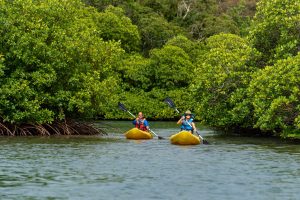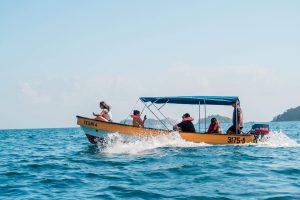Nestled in the Province of Colón, Portobelo is a vibrant village steeped in history and culture, home to around 10,320 residents as of the 2023 census. Discovered by Christopher Columbus in 1502, this picturesque coastal town has evolved into a UNESCO World Heritage site, recognized for its unique architectural heritage and rich cultural traditions, including the vibrant Congo dance and pirate lore. With its breathtaking Caribbean beaches and expansive natural park spanning over 35,000 hectares, Portobelo embodies a commitment to sustainable tourism, conservation, and community engagement, welcoming travelers who appreciate authentic experiences and local heritage.
HIGHLIGHTS
-

Cultural and Historical Significance:
Portobelo boasts a rich history, prominently featured in the restoration of the Royal Customs House, now home to the Afro-Panamanian Memory Museum. This historical site showcases three exhibition halls detailing the experiences of enslaved individuals, the town’s cultural heritage, and its colonial architecture. The museum is designed for inclusivity, providing braille displays for visually impaired visitors, reflecting Portobelo’s dedication to preserving its history while fostering an accessible cultural experience for all.
-

Sustainable Tourism Initiatives:
As part of the Tourism, Conservation, and Research (TCI) strategy, Portobelo emphasizes sustainable development that integrates local communities. Through initiatives led by the Bahía de Portobelo Foundation, children and young people are actively engaged in preserving their cultural identity through dance, art, and music. This community-driven approach not only enhances cultural pride but also fosters a sustainable tourism model that respects local traditions and promotes economic growth.
-

Marine Conservation and Ecotourism:
Portobelo’s natural beauty extends to its marine ecosystems, which are being leveraged for sustainable tourism activities like diving and snorkeling. The Reef 2 Reef Restoration Foundation is spearheading projects to restore coral reefs and create an underwater trail, promoting educational and scientific tourism. This innovative approach alleviates tourist pressure on sensitive areas, allowing visitors to explore the stunning coastal landscapes while contributing to marine conservation efforts. Additionally, water taxis provide convenient access to pristine beaches and guided tours through the lush forested areas of the nearby national park, enriching the visitor experience with opportunities to connect with nature.

